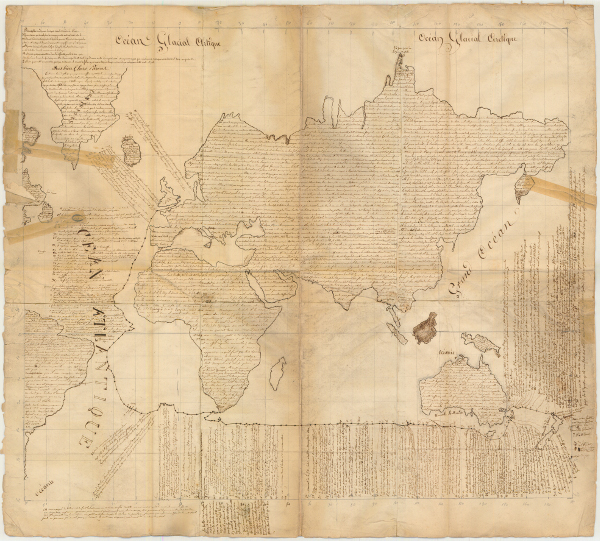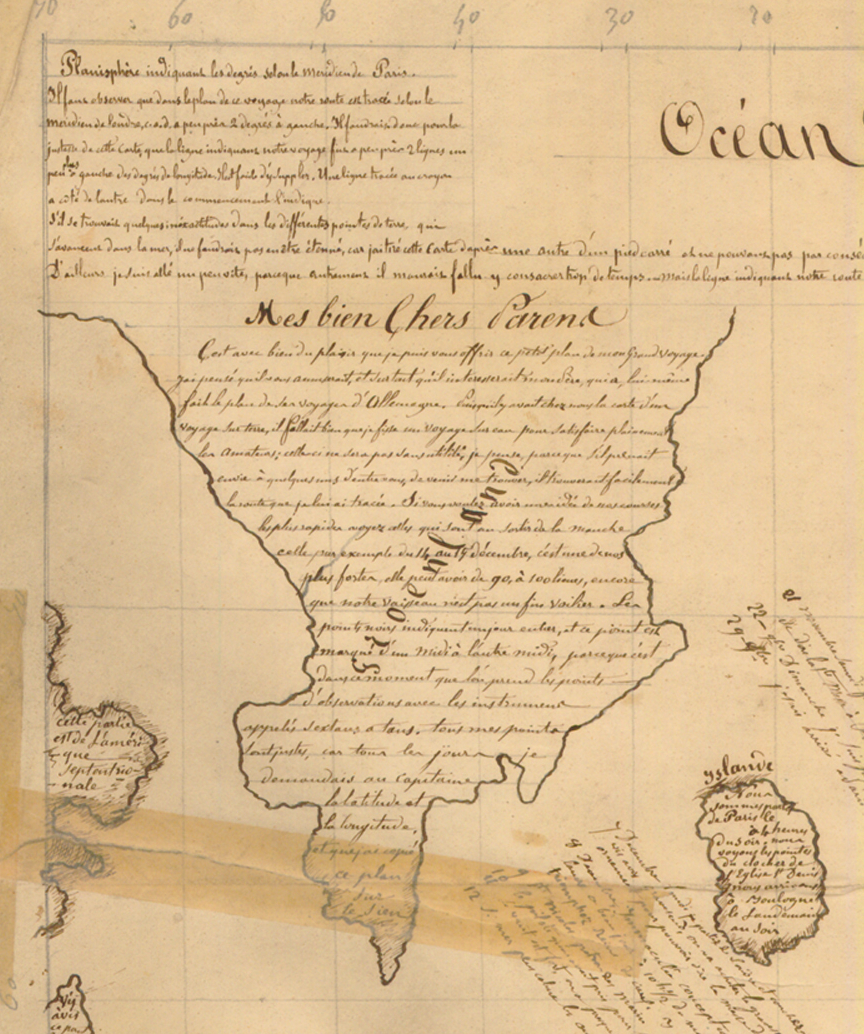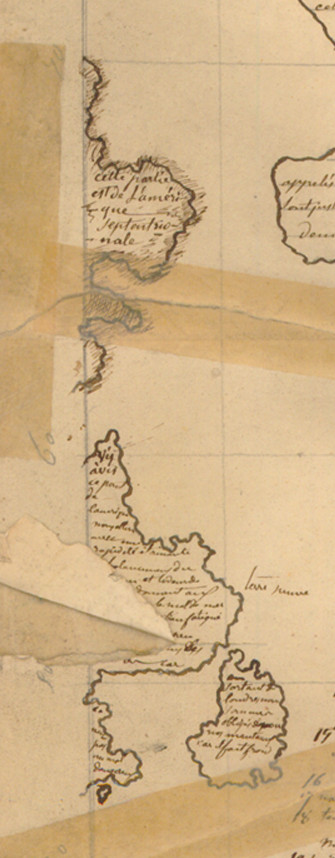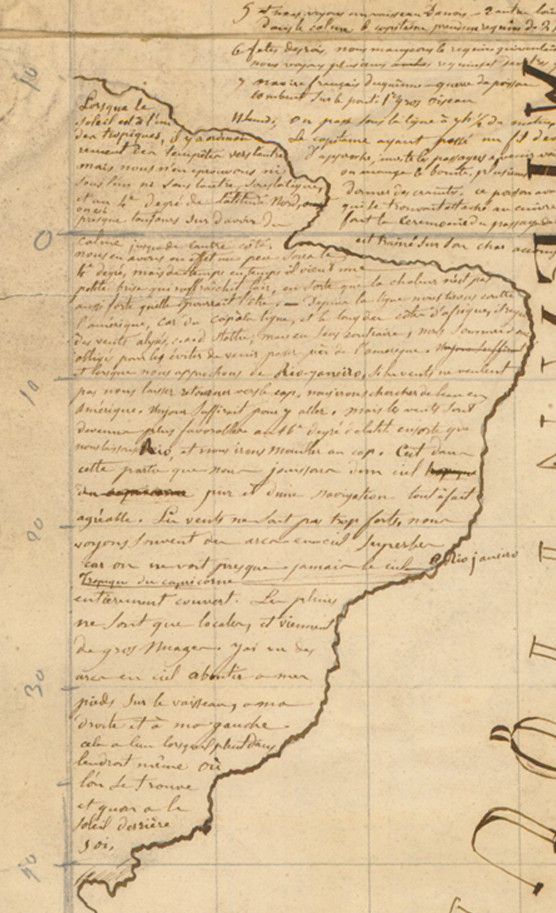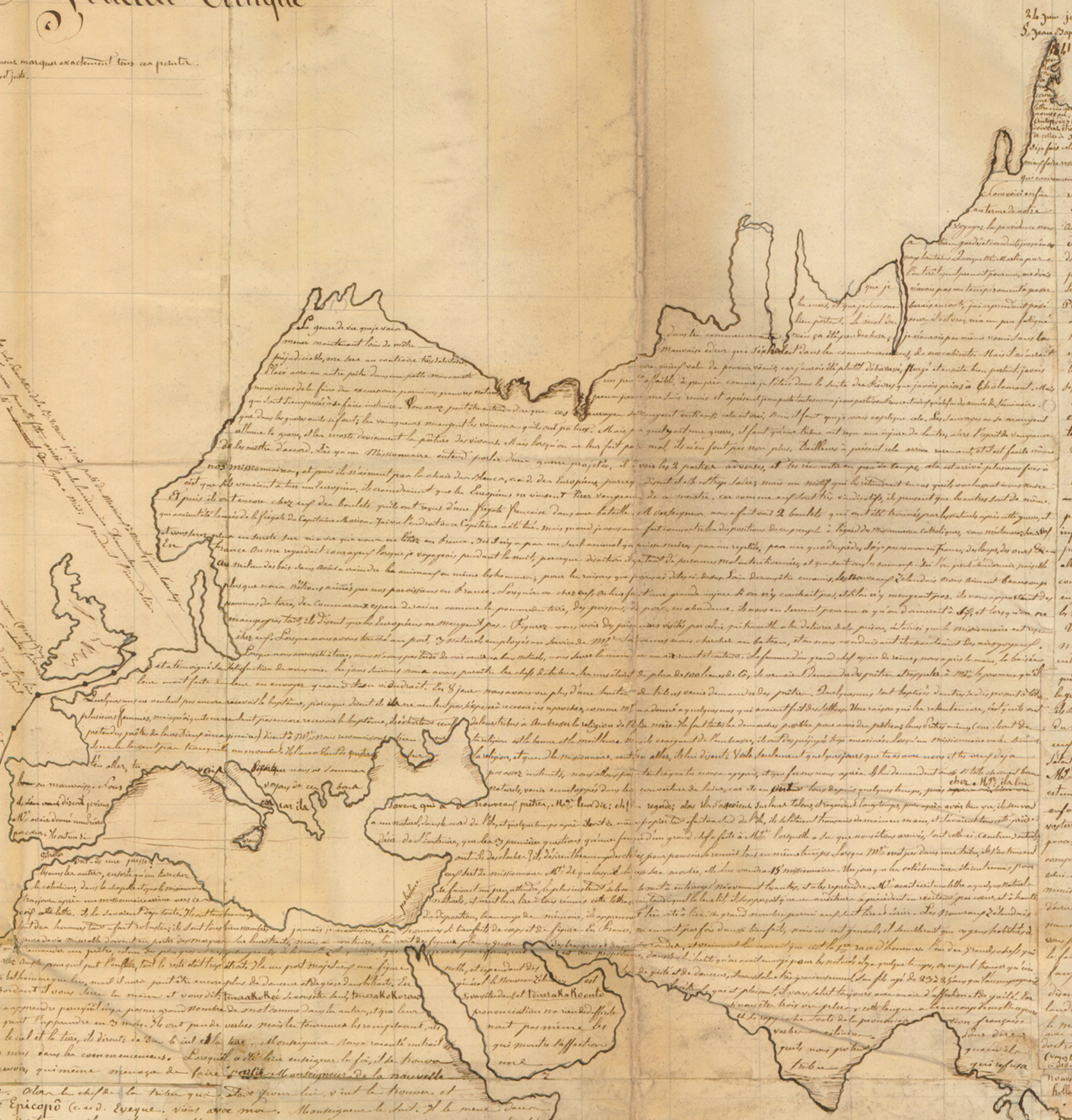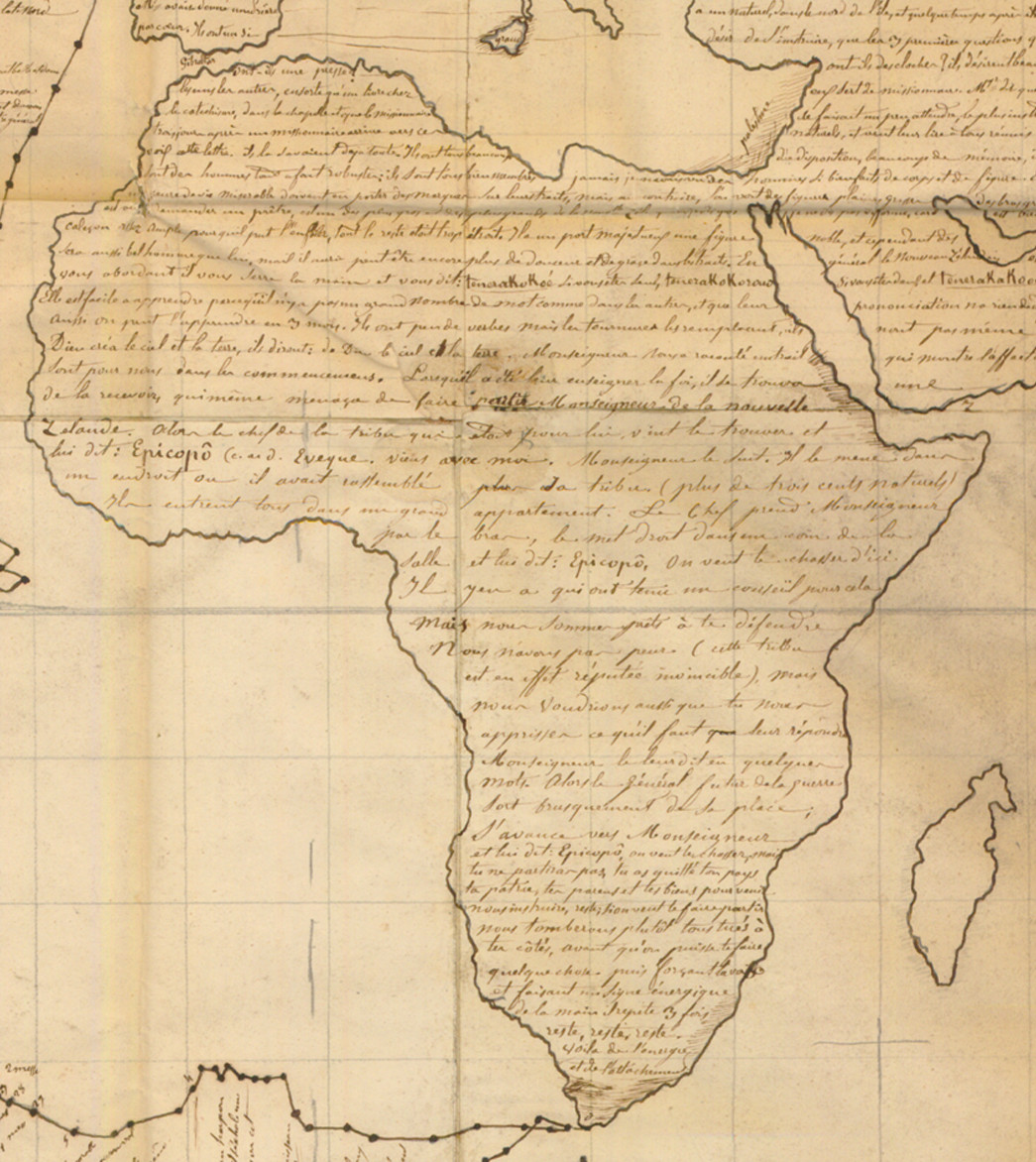Difference between revisions of "GarinMap"
From Marist Studies
| Line 100: | Line 100: | ||
[[Image:Garin_map_letter_Africa.jpg|center|]] | [[Image:Garin_map_letter_Africa.jpg|center|]] | ||
| + | |||
| + | |||
:['''Africa'''] | :['''Africa'''] | ||
| Line 106: | Line 108: | ||
:Have they got a printing press? Have they got any bells?” They are very keen on bells so they can summon people to a meeting. When the Bishop is not there, they teach each other, which means that a book does the same sort of work as a missionary. The Bishop says that when the printing press is set up it will be worth 15 missionaries. One day when the class had assembled for catechism in the chapel and the missionary was running a bit late, the one who knew the most got up and, simply imitating the missionary, started asking the others questions and correcting them. The Bishop had written a letter to a few natives. Three days later a missionary arrived and wanted to read the letter to the whole gathering. But as he read it, he realised that his listeners were ahead of him, reciting the letter out loud by heart. They already knew the whole letter. They are all eager to learn, have wonderful memories and they learn to read very quickly. Many of them can read and write. | :Have they got a printing press? Have they got any bells?” They are very keen on bells so they can summon people to a meeting. When the Bishop is not there, they teach each other, which means that a book does the same sort of work as a missionary. The Bishop says that when the printing press is set up it will be worth 15 missionaries. One day when the class had assembled for catechism in the chapel and the missionary was running a bit late, the one who knew the most got up and, simply imitating the missionary, started asking the others questions and correcting them. The Bishop had written a letter to a few natives. Three days later a missionary arrived and wanted to read the letter to the whole gathering. But as he read it, he realised that his listeners were ahead of him, reciting the letter out loud by heart. They already knew the whole letter. They are all eager to learn, have wonderful memories and they learn to read very quickly. Many of them can read and write. | ||
:The New Zealanders are very sturdy men; they all have very strong limbs. I’ve never seen men with such handsome bodies and faces. In France you sometimes see attractive men, but here it is general. You would think that people who are accustomed to such a miserable life would show some sign of this in their appearance. But the contrary is true: you see full fleshy faces, powerful arms and well-rounded legs, and you would really think that they are the leading race on earth. One of the big chiefs who came to ask for a priest is one of the tallest and most thickset in New Zealand. When I say ‘thickset’, I don’t mean that there is something wrong with him, for he is well proportioned. Among the clothes that were sent for the natives a little while ago, only one pair of shorts was large enough for him to wear. All the others were too small. He has a majestic bearing, a noble face, and yet there are moments when he can be lively and gentle, and he greets you very graciously. His son of about 23 or 25 who was with him will be just as handsome as his father but perhaps even more gentle and graceful in appearance. | :The New Zealanders are very sturdy men; they all have very strong limbs. I’ve never seen men with such handsome bodies and faces. In France you sometimes see attractive men, but here it is general. You would think that people who are accustomed to such a miserable life would show some sign of this in their appearance. But the contrary is true: you see full fleshy faces, powerful arms and well-rounded legs, and you would really think that they are the leading race on earth. One of the big chiefs who came to ask for a priest is one of the tallest and most thickset in New Zealand. When I say ‘thickset’, I don’t mean that there is something wrong with him, for he is well proportioned. Among the clothes that were sent for the natives a little while ago, only one pair of shorts was large enough for him to wear. All the others were too small. He has a majestic bearing, a noble face, and yet there are moments when he can be lively and gentle, and he greets you very graciously. His son of about 23 or 25 who was with him will be just as handsome as his father but perhaps even more gentle and graceful in appearance. | ||
| − | In general the New Zealander is full of fun, lively and sociable. He greets you with obvious affection and pleasure. When he comes up to you, he shakes your hand and says: “Ten ra ko koe” if you are by yourself, “tena ra ko korua” if there are two of you, and “Tena ra ko ko koutou” if there are three or more of you. This language has many words like this. It is easy to learn because there are not as many words as in other languages, and their pronunciation presents no difficulty and is very close to French. This means you can learn it in three months. They have few verbs but they have other ways of saying the same thing. They don’t even have auxiliary verbs. To say “god created heaven and earth”, they say: “of God heaven and earth”. | + | :In general the New Zealander is full of fun, lively and sociable. He greets you with obvious affection and pleasure. When he comes up to you, he shakes your hand and says: “Ten ra ko koe” if you are by yourself, “tena ra ko korua” if there are two of you, and “Tena ra ko ko koutou” if there are three or more of you. This language has many words like this. It is easy to learn because there are not as many words as in other languages, and their pronunciation presents no difficulty and is very close to French. This means you can learn it in three months. They have few verbs but they have other ways of saying the same thing. They don’t even have auxiliary verbs. To say “god created heaven and earth”, they say: “of God heaven and earth”. |
:The Bishop told us a story that shows the affection of those who sided with us right from the start. When he went to teach them the faith, he found one tribe that refused to have anything to do with him, that even threatened to make the Bishop leave New Zealand. Then the chief of the tribe who supported him came and said to him: “Epicopo (i.e. Bishop), come with me.” The Bishop followed him. He was taken to where his tribe was assembled, more than three hundred of them. They went into a large building, The chief took the bishop by the arm, go him to stand in a corner of the room and said: “Epicopo, they want to get rid of you. Some people have held a meeting about this, but we are ready to defend you. We are not afraid (this tribe is seen as invincible), but we would like you to tell us what we should say to them. The Bishop told them in a few words. Then the future war-leader suddenly leaves his place, goes up the Bishop and says to him: “Epicopo, people want to get rid of you, but you will not leave. You have left your country, your parents and your possession to come and teach us. So stay. If anyone wants you to leave, we would all rather be killed at your side than let anything happen to you.” Then raising his voice and gesturing energetically with his hand, he repeated: “Stay, stay, stay.” There is energy and loyalty for you. | :The Bishop told us a story that shows the affection of those who sided with us right from the start. When he went to teach them the faith, he found one tribe that refused to have anything to do with him, that even threatened to make the Bishop leave New Zealand. Then the chief of the tribe who supported him came and said to him: “Epicopo (i.e. Bishop), come with me.” The Bishop followed him. He was taken to where his tribe was assembled, more than three hundred of them. They went into a large building, The chief took the bishop by the arm, go him to stand in a corner of the room and said: “Epicopo, they want to get rid of you. Some people have held a meeting about this, but we are ready to defend you. We are not afraid (this tribe is seen as invincible), but we would like you to tell us what we should say to them. The Bishop told them in a few words. Then the future war-leader suddenly leaves his place, goes up the Bishop and says to him: “Epicopo, people want to get rid of you, but you will not leave. You have left your country, your parents and your possession to come and teach us. So stay. If anyone wants you to leave, we would all rather be killed at your side than let anything happen to you.” Then raising his voice and gesturing energetically with his hand, he repeated: “Stay, stay, stay.” There is energy and loyalty for you. | ||
Revision as of 11:29, 30 December 2016
Father Antoine Garin. Map of the World, 1840-1, Letter to his parents
Translated by Fr Brian Quin SM. (Not all the annotations are included in this translation)
- [Greenland]
- Planisphere indicating the degrees according to the Paris meridian. It must be realized on the map of the voyage the route we took is drawn according to the London meridian, i.e. about 2 degrees to the left. So for the map to be correct, the line showing our route would have to be 2 lines further left of the degrees of longitude. It’s easy enough to make the adjustment. A pencil line next to the other one at the beginning shows where it should go.
- If there are some inaccuracies in the different promontories that extend into the sea, don't be surprised, as I draw this map from another that was only one foot square and so I couldn’t depict these precisely. And I did draw if fairly quickly, because otherwise I’d have had to spend too much time on it. But the line indicating our route is accurate.
- My dearest parents
- It's a great pleasure to me to send you this little map of my big trip. I thought you would like it and that my father would be particularly interested in it, as he did a map of where he went in Germany. Because we had a map at our place of a land journey, I had to make a sea voyage if I was to please the connoisseurs. This map could even be useful, in my opinion, as, if any of you wanted to come and find me, they could easily follow the route I've shown. If you want to have an idea of the fastest sections of our voyage, look at the ones as we were leaving the English Channel, the one for the 14 to 15th December, for example. It is one of our best, around 90 or 100 leagues, even though our ship is no fast clipper. The little black circles mark off the days. They go from midday to midday, because that is when our position is established with instruments called T-sextants. All these are correctly positioned as I asked the captain our latitude and longitude every day and I copied my map from his.
- [Iceland]
- We left Paris on the [blank] at 4.p.m. We saw the tops of the steeple of the St Denis church. We arrived at Boulogne the evening of the following day.
- [Newfoundland]
- Leaving London, we had to put our coats on as it was cold.
- [North America]
- This is part of North America
- At the latitude of this part of America we sailed with amazing speed. The rolling of the ship and the smell of the sea made the passengers seasick. Some were feeling extremely weak, others only slightly. We had a good laugh at each other as it wasn’t anything serious.
- [South America]
- When the sun is above one of the tropics, there are usually storms at the other, but we had none at either tropic. Below the Equator and at 4 degrees north, you are nearly always sure of not having much wind until you get to the other side. And, sure enough, we experienced this a little beneath the 4th degree, but there is a light breeze from time to time to refresh the air, so the heat is not as bad as it could be. Below the Equator we sail towards America, because from the Cape to the Equator along the coasts of Africa, the trade winds prevail and they are steady but against us. So to avoid them we have been obliged to sail near America. And when we get near Rio de Janeiro, if the winds prevent us heading for the Cape, we will call in for fresh water in America. It would only take a day. But the winds have become more favourable at 16 degrees south and so we won’t go to Rio and we will call in at the Cape instead. During this part of the trip we have enjoyed a clear blue sky and very pleasant sailing. The winds are not too strong, we often see wonderful rainbows as the sky is hardly ever totally overcast. The rain is only local and comes from thick clouds. I’ve seen rainbows come right down to my feet on the hip, to the right and left of me. This happens when it rains right where you are and the sun is behind you.
- [Asia]
- 24 June, St John the Baptist Day, 1841
- Here I am writing you a rather new sort of letter; but in the Antipodes things are necessarily different from in France. What I’m trying to do is highlight the seas that surround the pieces of land. Here we are at the end of our voyage. Providence has kept us safe and brought us to these far-off lands. Although Mr martin, out of concern for me, told me that I didn’t have the right temperament for crossing the seas and that I would not survive the journey, I have got through in perfect health. Certainly I felt rather weak at the beginning as a result of seasickness, but it was nothing really. I wouldn’t even have been sick if it hadn’t been for the foul smell of our toilets in those early days. But I should have vomited sooner, for I would have got over it faster and felt better. I felt a bit weaker, rather like I was after the fevers I had caught at Chalamont, but I gradually got better and I’m now as fit and healthy as I used to be in France and better than I was at the end of my years at the seminary.
- [Europe]
- The sort of life I am going to lead here won't do me any harm and will, on the contrary, be very good for me. I'm sharing a little house with another priest and from there we’ll make various excursions among these poor natives who are so anxious to be educated. You have perhaps heard that these savages eat each. other. That is true, but it needs some explanation. The savages eat each other only when they are at war with each other. The winners eat the losers that they have killed. But for a war to take place, a tribe must be wronged by another tribe. Then their vengeful nature sparks a war, and the dead become the food of the living. But if you don't do them any harm, they don't harm you either. And anyway war is rare now, and it is easy to settle their differences. As soon as a missionary hears about an impending war, he goes to see the two sides, and quickly reconciles them. This has happened several times with our missionaries, and anyway they don't like white people's -meaning Europeans' – flesh because, they say, it is too salty. But what would hold them back, even if they wished to harm us, is that if they killed a European, they would be afraid that Europeans would come and seek vengeance; for the murder because, as they are vindictive, they think that everyone else is too. And, what’s more they still have some cannon-balls that were fired at them in battle by a French frigate. The Bishop showed us two cannon-balls that the natives found after this war and which were fired by Captain Marion's frigate. I have seen the spot where this captain was killed. But when I tell you about the attitude of this people towards the Catholic missionaries you will realise how lucky I am and you will feel more confident about my safety than you were when I was in France.
- There’s not a single harmful animal here, no reptiles, no quadrupeds. There are no wolves or bears as there are in France. In France I was seen as brave when I ventured out at night because, people said, there were so many vicious people about, quite apart from the animals. Here you can sleep safely in the middle of the woods without having to worry about animals or people, for the reasons I have given. Far from being our enemies, the New Zealanders are very fond of us, even more so than our parishioners back in France. When you go to visit them, it would be felt as a major insult if you didn’t spend the night with them. They bring you potatoes, kumaras (a sort of root like potatoes), fish and pork, in great quantities. Each person is offered enough food for six and, if you don’t eat the lot, the say that Europeans don’t eat. Imagine prisoners being visited by people working to have them freed, that’s how a missionary is welcomed by them.
- When we came into the port, three natives employed in the Bishop’s service came out to the boat to get us and, as they brought us ashore, they sang away happily. As soon as we go to land, various good natives came up and shook us by the hand, all happy and laughing, The wife of an important chief, a sort of queen, took us by the hand, kissed it and expressed her joy at seeing us. The following days saw the arrival of tribal chiefs, some from more than 100 leagues away. They had come to ask for priests and to remind the bishop of his promise to send them one when more arrived. Within a week we saw more than eight tribes coming and asking for priests. Some people are baptised, others are ready to be. Some don’t want to be baptised yet because, they say, they don’t want to be exposed to the sort of criticism that the bishop has levelled at some who have done silly things. Another problem holds them back: they have more than one wife. But even if they don’t want to baptised yet, they strongly encourage the members of their tribe to embrace the religion of the Mother Church. They do everything they can to get priests. Their own priests (for they have so-called priests of their imaginary gods) say to the Bishop: “We recognise that your religion is the right and best one.” But they are afraid to embrace it, their prejudices are too deeply ingrained.
- When a missionary goes to see them, they don’t give him a moment’s peace. They overwhelm him with questions about religion. And when the missionary wants to leave, they say: “You’ve only been with us a for a few days and you want to leave already. Surely you can see that we haven’t had enough lessons. We are going to forget everything you’ve told us. Then what will we do?” They also ask whether something or other is good or bad. We see some of these good natives come to the Bishop’s wrapped in their woollen blankets (for they’ve all had one for some time now), and telling him that they have come because they know he has some new priests. The Bishop tells them “OK, have a look at them.” And they sit on their heels and have a long look, and then after a careful examination they leave. The Bishop had given a copy of prayer to a native in the north of the island and some time later he saw the same piece of paper in the far south of the island. It had been passed from hand to hand, and they all knew this prayer by heart. They have such a great yearning for knowledge that the first three questions asked by the wife of a big chief when she knew of our arrival were: “How many are there?
- [Africa]
- Have they got a printing press? Have they got any bells?” They are very keen on bells so they can summon people to a meeting. When the Bishop is not there, they teach each other, which means that a book does the same sort of work as a missionary. The Bishop says that when the printing press is set up it will be worth 15 missionaries. One day when the class had assembled for catechism in the chapel and the missionary was running a bit late, the one who knew the most got up and, simply imitating the missionary, started asking the others questions and correcting them. The Bishop had written a letter to a few natives. Three days later a missionary arrived and wanted to read the letter to the whole gathering. But as he read it, he realised that his listeners were ahead of him, reciting the letter out loud by heart. They already knew the whole letter. They are all eager to learn, have wonderful memories and they learn to read very quickly. Many of them can read and write.
- The New Zealanders are very sturdy men; they all have very strong limbs. I’ve never seen men with such handsome bodies and faces. In France you sometimes see attractive men, but here it is general. You would think that people who are accustomed to such a miserable life would show some sign of this in their appearance. But the contrary is true: you see full fleshy faces, powerful arms and well-rounded legs, and you would really think that they are the leading race on earth. One of the big chiefs who came to ask for a priest is one of the tallest and most thickset in New Zealand. When I say ‘thickset’, I don’t mean that there is something wrong with him, for he is well proportioned. Among the clothes that were sent for the natives a little while ago, only one pair of shorts was large enough for him to wear. All the others were too small. He has a majestic bearing, a noble face, and yet there are moments when he can be lively and gentle, and he greets you very graciously. His son of about 23 or 25 who was with him will be just as handsome as his father but perhaps even more gentle and graceful in appearance.
- In general the New Zealander is full of fun, lively and sociable. He greets you with obvious affection and pleasure. When he comes up to you, he shakes your hand and says: “Ten ra ko koe” if you are by yourself, “tena ra ko korua” if there are two of you, and “Tena ra ko ko koutou” if there are three or more of you. This language has many words like this. It is easy to learn because there are not as many words as in other languages, and their pronunciation presents no difficulty and is very close to French. This means you can learn it in three months. They have few verbs but they have other ways of saying the same thing. They don’t even have auxiliary verbs. To say “god created heaven and earth”, they say: “of God heaven and earth”.
- The Bishop told us a story that shows the affection of those who sided with us right from the start. When he went to teach them the faith, he found one tribe that refused to have anything to do with him, that even threatened to make the Bishop leave New Zealand. Then the chief of the tribe who supported him came and said to him: “Epicopo (i.e. Bishop), come with me.” The Bishop followed him. He was taken to where his tribe was assembled, more than three hundred of them. They went into a large building, The chief took the bishop by the arm, go him to stand in a corner of the room and said: “Epicopo, they want to get rid of you. Some people have held a meeting about this, but we are ready to defend you. We are not afraid (this tribe is seen as invincible), but we would like you to tell us what we should say to them. The Bishop told them in a few words. Then the future war-leader suddenly leaves his place, goes up the Bishop and says to him: “Epicopo, people want to get rid of you, but you will not leave. You have left your country, your parents and your possession to come and teach us. So stay. If anyone wants you to leave, we would all rather be killed at your side than let anything happen to you.” Then raising his voice and gesturing energetically with his hand, he repeated: “Stay, stay, stay.” There is energy and loyalty for you.
